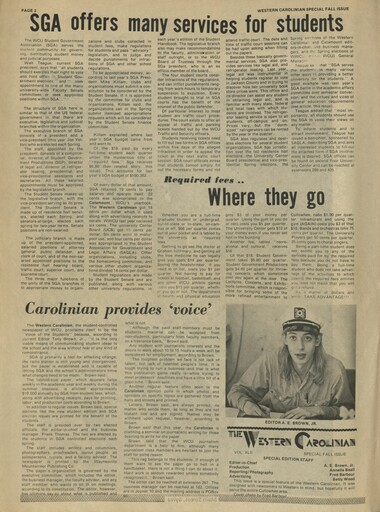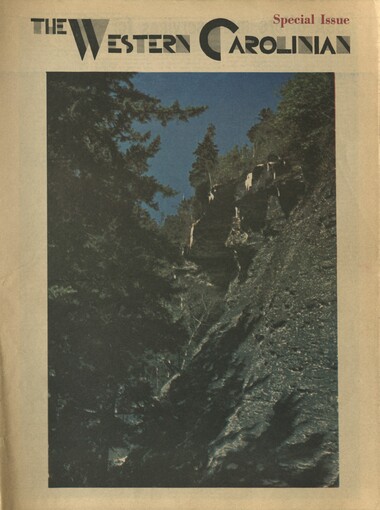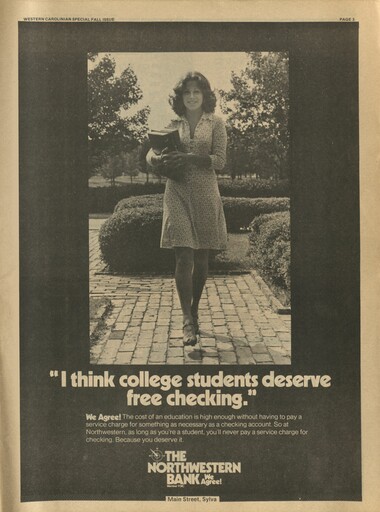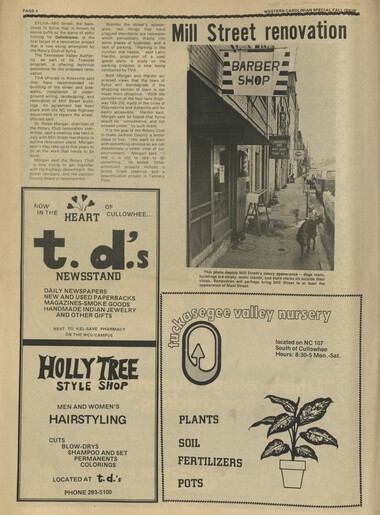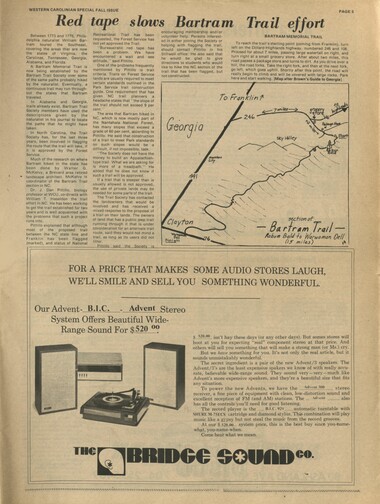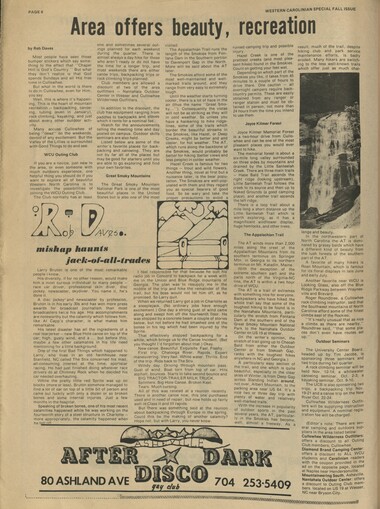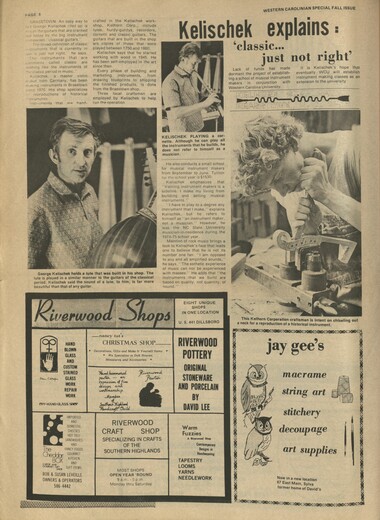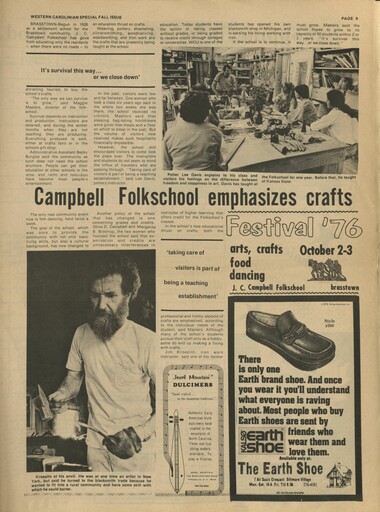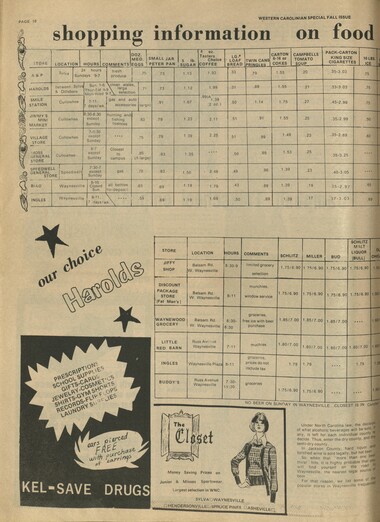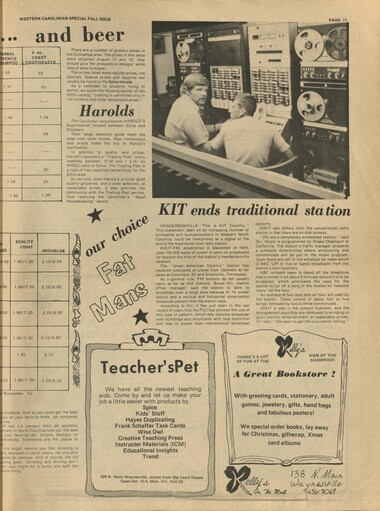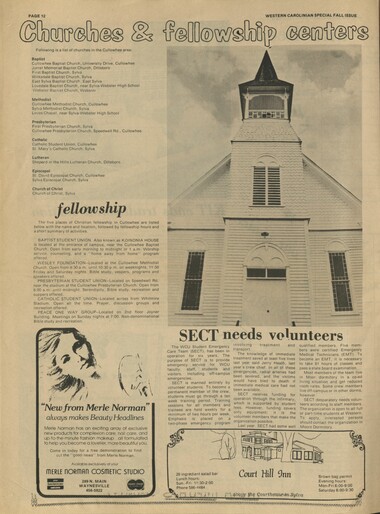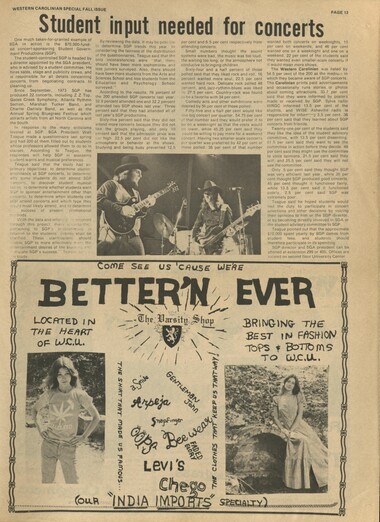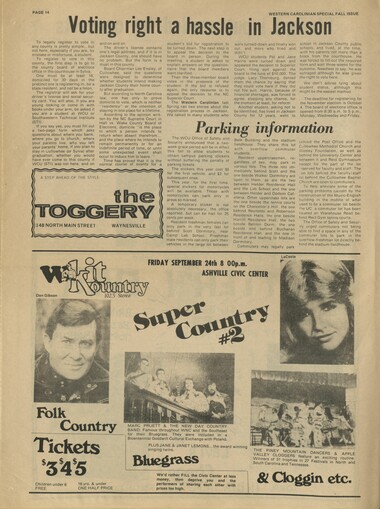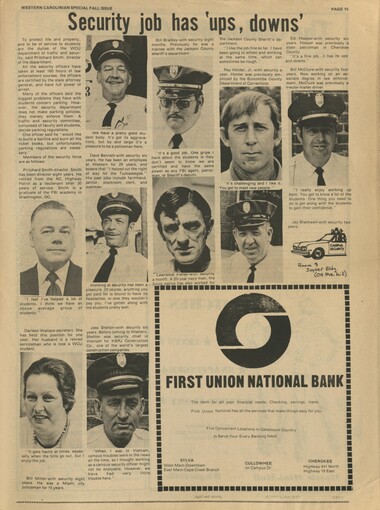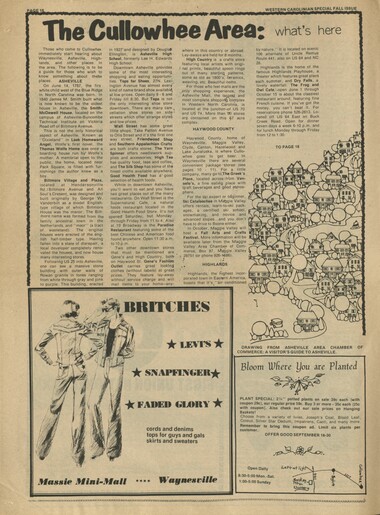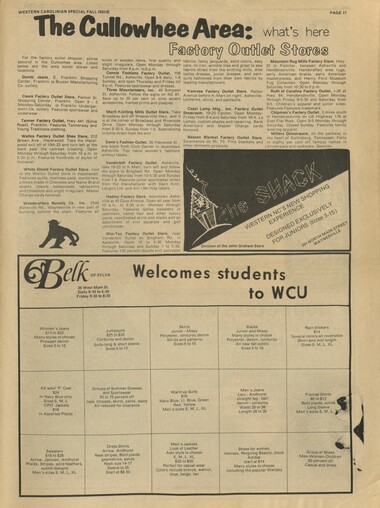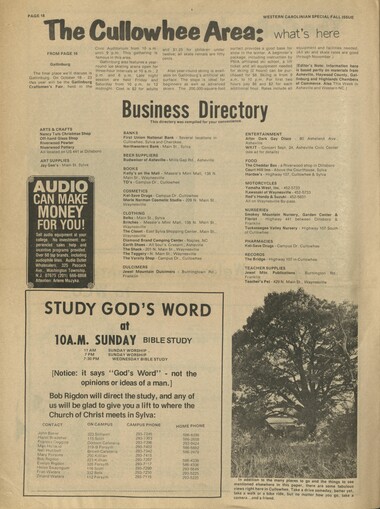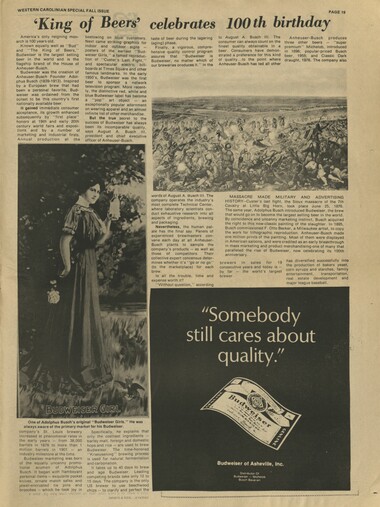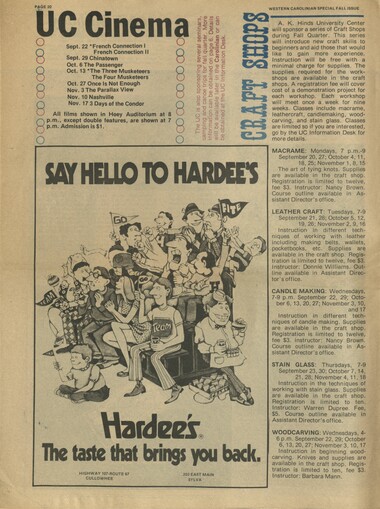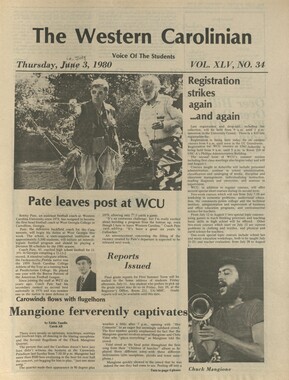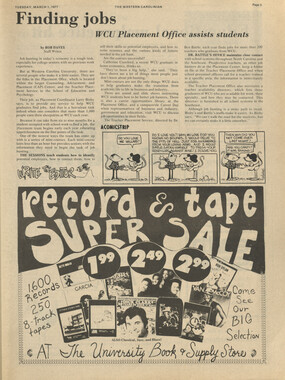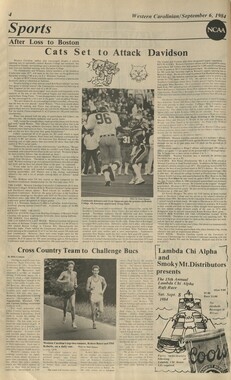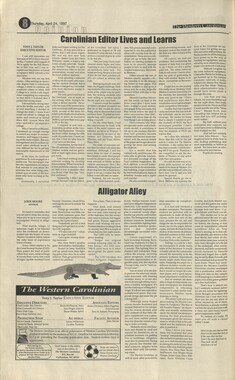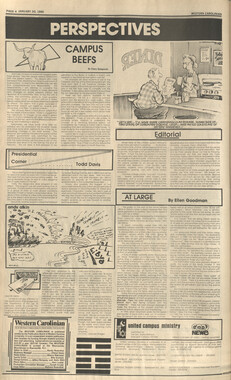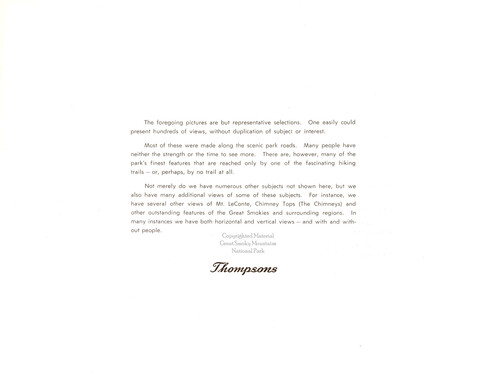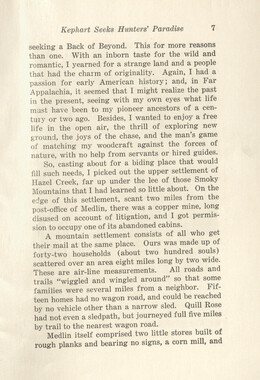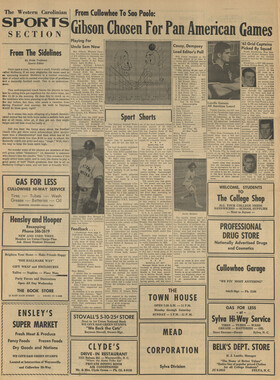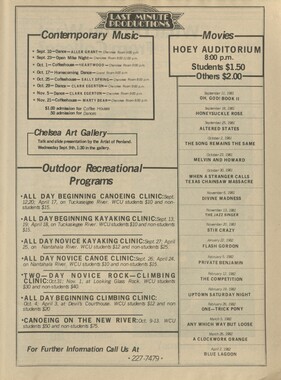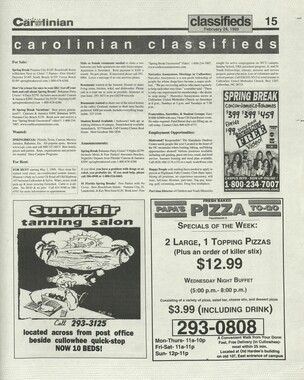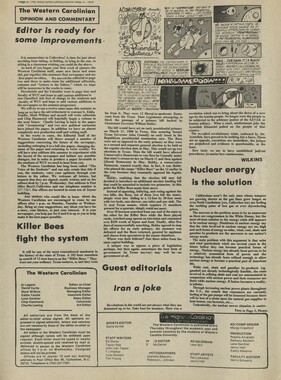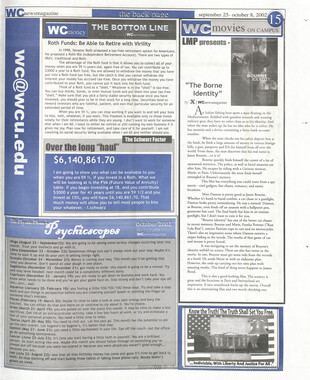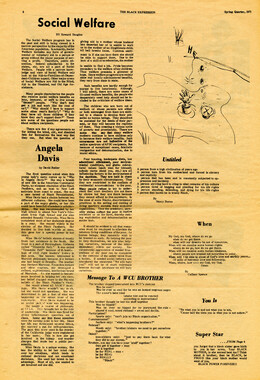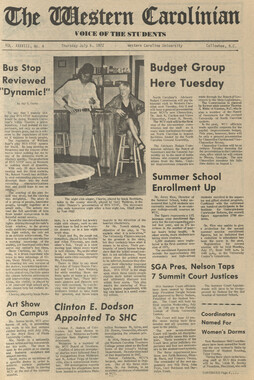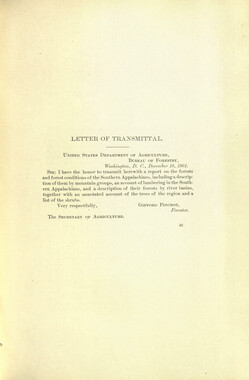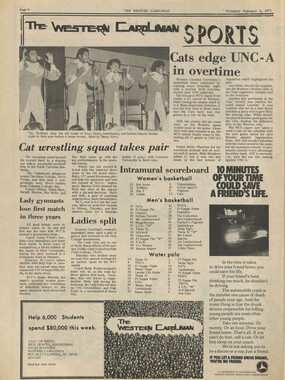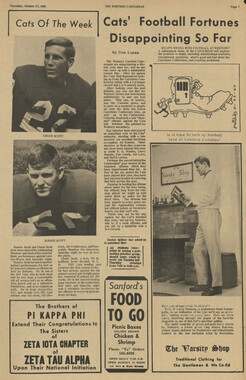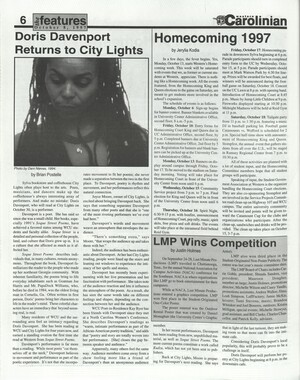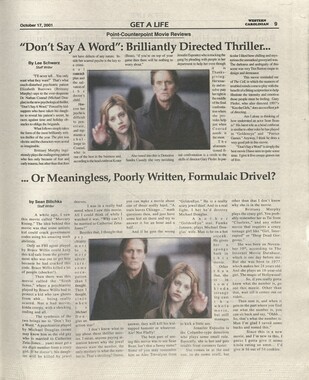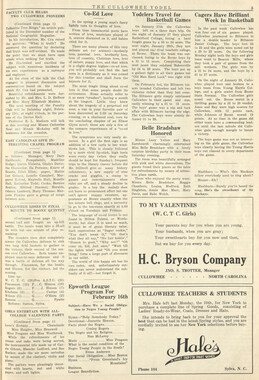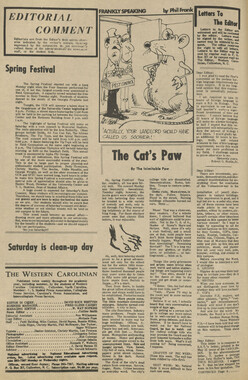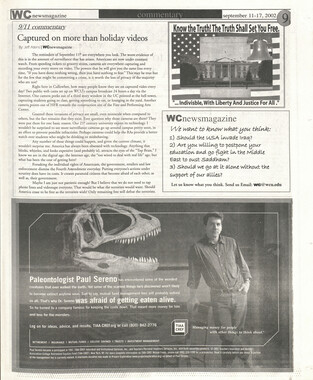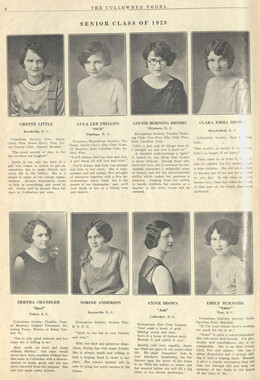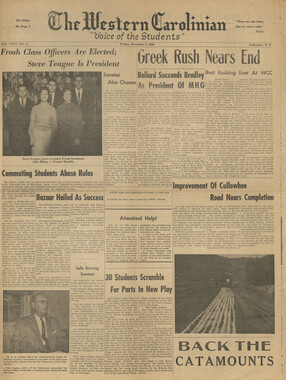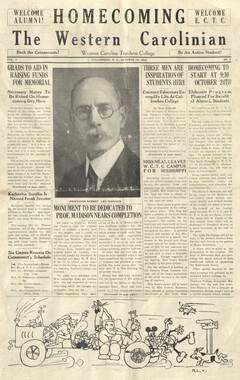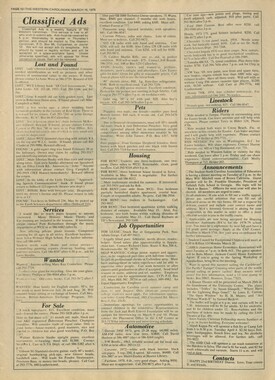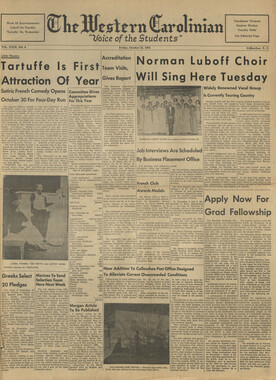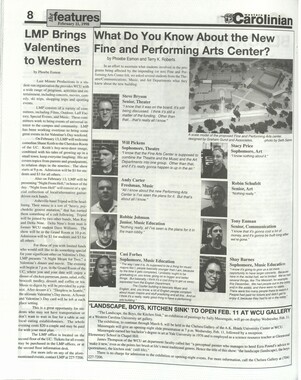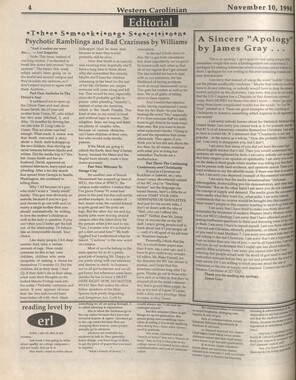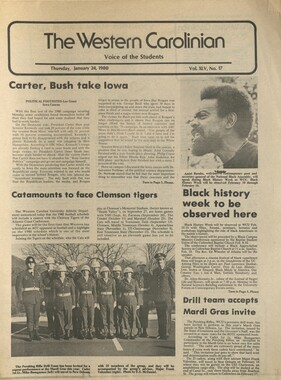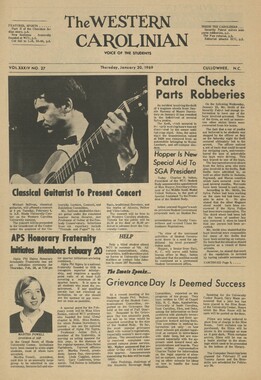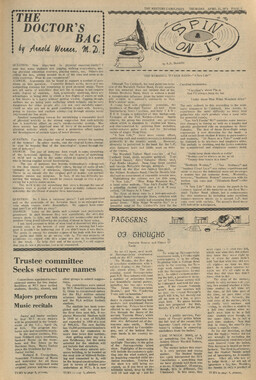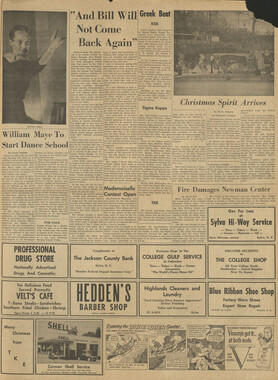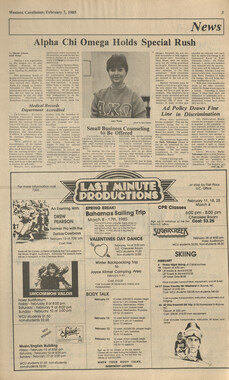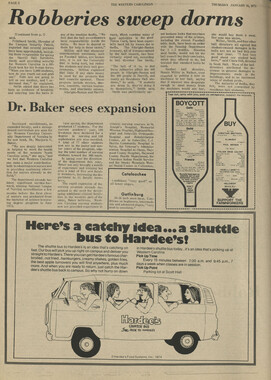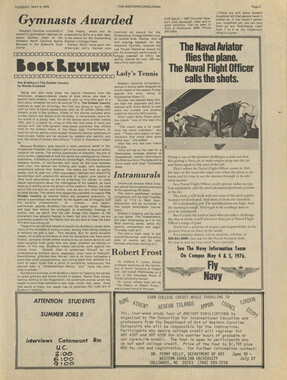Western Carolina University (20)
View all
- Canton Champion Fibre Company (2308)
- Cherokee Traditions (292)
- Civil War in Southern Appalachia (165)
- Craft Revival (1942)
- Great Smoky Mountains - A Park for America (2766)
- Highlights from Western Carolina University (430)
- Horace Kephart (941)
- Journeys Through Jackson (154)
- LGBTQIA+ Archive of Jackson County (81)
- Oral Histories of Western North Carolina (314)
- Picturing Appalachia (6772)
- Stories of Mountain Folk (413)
- Travel Western North Carolina (160)
- Western Carolina University Fine Art Museum Vitreograph Collection (129)
- Western Carolina University Herbarium (92)
- Western Carolina University: Making Memories (708)
- Western Carolina University Publications (2283)
- Western Carolina University Restricted Electronic Theses and Dissertations (146)
- Western North Carolina Regional Maps (71)
- World War II in Southern Appalachia (131)
University of North Carolina Asheville (6)
View all
- Allanstand Cottage Industries (62)
- Appalachian National Park Association (53)
- Bennett, Kelly, 1890-1974 (1388)
- Berry, Walter (76)
- Brasstown Carvers (40)
- Carver, George Washington, 1864?-1943 (26)
- Cathey, Joseph, 1803-1874 (1)
- Champion Fibre Company (233)
- Champion Paper and Fibre Company (297)
- Cherokee Indian Fair Association (16)
- Cherokee Language Program (22)
- Crowe, Amanda (40)
- Edmonston, Thomas Benton, 1842-1907 (7)
- Ensley, A. L. (Abraham Lincoln), 1865-1948 (275)
- Fromer, Irving Rhodes, 1913-1994 (70)
- George Butz (BFS 1907) (46)
- Goodrich, Frances Louisa (120)
- Grant, George Alexander, 1891-1964 (96)
- Heard, Marian Gladys (60)
- Kephart, Calvin, 1883-1969 (15)
- Kephart, Horace, 1862-1931 (313)
- Kephart, Laura, 1862-1954 (39)
- Laney, Gideon Thomas, 1889-1976 (439)
- Masa, George, 1881-1933 (61)
- McElhinney, William Julian, 1896-1953 (44)
- Niggli, Josephina, 1910-1983 (10)
- North Carolina Park Commission (105)
- Osborne, Kezia Stradley (9)
- Owens, Samuel Robert, 1918-1995 (11)
- Penland Weavers and Potters (36)
- Roberts, Vivienne (15)
- Roth, Albert, 1890-1974 (142)
- Schenck, Carl Alwin, 1868-1955 (1)
- Sherrill's Photography Studio (2565)
- Southern Highland Handicraft Guild (127)
- Southern Highlanders, Inc. (71)
- Stalcup, Jesse Bryson (46)
- Stearns, I. K. (213)
- Thompson, James Edward, 1880-1976 (226)
- United States. Indian Arts and Crafts Board (130)
- USFS (683)
- Vance, Zebulon Baird, 1830-1894 (1)
- Weaver, Zebulon, 1872-1948 (58)
- Western Carolina College (230)
- Western Carolina Teachers College (282)
- Western Carolina University (1794)
- Western Carolina University. Mountain Heritage Center (18)
- Whitman, Walt, 1819-1892 (10)
- Wilburn, Hiram Coleman, 1880-1967 (73)
- Williams, Isadora (3)
- Cain, Doreyl Ammons (0)
- Crittenden, Lorraine (0)
- Rhodes, Judy (0)
- Smith, Edward Clark (0)
- Appalachian Region, Southern (2402)
- Asheville (N.C.) (1917)
- Avery County (N.C.) (26)
- Blount County (Tenn.) (161)
- Buncombe County (N.C.) (1671)
- Cherokee County (N.C.) (283)
- Clay County (N.C.) (555)
- Graham County (N.C.) (233)
- Great Smoky Mountains National Park (N.C. and Tenn.) (510)
- Haywood County (N.C.) (3521)
- Henderson County (N.C.) (70)
- Jackson County (N.C.) (4693)
- Knox County (Tenn.) (25)
- Knoxville (Tenn.) (12)
- Lake Santeetlah (N.C.) (10)
- Macon County (N.C.) (420)
- Madison County (N.C.) (211)
- McDowell County (N.C.) (39)
- Mitchell County (N.C.) (132)
- Polk County (N.C.) (35)
- Qualla Boundary (981)
- Rutherford County (N.C.) (76)
- Swain County (N.C.) (2113)
- Transylvania County (N.C.) (270)
- Watauga County (N.C.) (12)
- Waynesville (N.C.) (73)
- Yancey County (N.C.) (72)
- Aerial Photographs (3)
- Aerial Views (60)
- Albums (books) (4)
- Articles (1)
- Artifacts (object Genre) (228)
- Bibliographies (1)
- Biography (general Genre) (2)
- Cards (information Artifacts) (38)
- Clippings (information Artifacts) (191)
- Crafts (art Genres) (622)
- Depictions (visual Works) (21)
- Design Drawings (1)
- Drawings (visual Works) (184)
- Envelopes (73)
- Facsimiles (reproductions) (1)
- Fiction (general Genre) (4)
- Financial Records (12)
- Fliers (printed Matter) (67)
- Glass Plate Negatives (381)
- Guidebooks (2)
- Internegatives (10)
- Interviews (812)
- Land Surveys (102)
- Letters (correspondence) (1013)
- Manuscripts (documents) (618)
- Maps (documents) (177)
- Memorandums (25)
- Minutes (administrative Records) (59)
- Negatives (photographs) (5835)
- Newsletters (1285)
- Newspapers (2)
- Occupation Currency (1)
- Paintings (visual Works) (1)
- Pen And Ink Drawings (1)
- Periodicals (193)
- Personal Narratives (10)
- Photographs (12976)
- Plans (maps) (1)
- Poetry (6)
- Portraits (1960)
- Postcards (329)
- Programs (documents) (151)
- Publications (documents) (2236)
- Questionnaires (65)
- Scrapbooks (282)
- Sheet Music (2)
- Slides (photographs) (402)
- Songs (musical Compositions) (2)
- Sound Recordings (796)
- Specimens (92)
- Speeches (documents) (15)
- Tintypes (photographs) (8)
- Transcripts (322)
- Video Recordings (physical Artifacts) (23)
- Vitreographs (129)
- Text Messages (0)
- A.L. Ensley Collection (275)
- Appalachian Industrial School Records (7)
- Appalachian National Park Association Records (336)
- Axley-Meroney Collection (2)
- Bayard Wootten Photograph Collection (20)
- Bethel Rural Community Organization Collection (7)
- Blumer Collection (5)
- C.W. Slagle Collection (20)
- Canton Area Historical Museum (2110)
- Carlos C. Campbell Collection (282)
- Cataloochee History Project (64)
- Cherokee Studies Collection (4)
- Daisy Dame Photograph Album (5)
- Daniel Boone VI Collection (1)
- Doris Ulmann Photograph Collection (112)
- Elizabeth H. Lasley Collection (1)
- Elizabeth Woolworth Szold Fleharty Collection (4)
- Frank Fry Collection (95)
- George Masa Collection (173)
- Gideon Laney Collection (452)
- Hazel Scarborough Collection (2)
- Hiram C. Wilburn Papers (28)
- Historic Photographs Collection (236)
- Horace Kephart Collection (861)
- Humbard Collection (33)
- Hunter and Weaver Families Collection (1)
- I. D. Blumenthal Collection (4)
- Isadora Williams Collection (4)
- Jesse Bryson Stalcup Collection (47)
- Jim Thompson Collection (224)
- John B. Battle Collection (7)
- John C. Campbell Folk School Records (80)
- John Parris Collection (6)
- Judaculla Rock project (2)
- Kelly Bennett Collection (1407)
- Love Family Papers (11)
- Major Wiley Parris Civil War Letters (3)
- Map Collection (12)
- McFee-Misemer Civil War Letters (34)
- Mountain Heritage Center Collection (4)
- Norburn - Robertson - Thomson Families Collection (44)
- Pauline Hood Collection (7)
- Pre-Guild Collection (2)
- Qualla Arts and Crafts Mutual Collection (12)
- R.A. Romanes Collection (681)
- Rosser H. Taylor Collection (1)
- Samuel Robert Owens Collection (94)
- Sara Madison Collection (144)
- Sherrill Studio Photo Collection (2558)
- Smoky Mountains Hiking Club Collection (616)
- Stories of Mountain Folk - Radio Programs (374)
- The Reporter, Western Carolina University (510)
- Venoy and Elizabeth Reed Collection (16)
- WCU Gender and Sexuality Oral History Project (32)
- WCU Mountain Heritage Center Oral Histories (25)
- WCU Oral History Collection - Mountain People, Mountain Lives (71)
- WCU Students Newspapers Collection (1744)
- Western North Carolina Tomorrow Black Oral History Project (69)
- William Williams Stringfield Collection (2)
- Zebulon Weaver Collection (109)
- African Americans (390)
- Appalachian Trail (35)
- Artisans (521)
- Cherokee art (84)
- Cherokee artists -- North Carolina (10)
- Cherokee language (21)
- Cherokee pottery (101)
- Cherokee women (208)
- Church buildings (167)
- Civilian Conservation Corps (U.S.) (110)
- College student newspapers and periodicals (1830)
- Dams (103)
- Dance (1023)
- Education (222)
- Floods (61)
- Folk music (1015)
- Forced removal, 1813-1903 (2)
- Forest conservation (220)
- Forests and forestry (1058)
- Gender nonconformity (4)
- Great Smoky Mountains National Park (N.C. and Tenn.) (181)
- Hunting (38)
- Landscape photography (25)
- Logging (103)
- Maps (83)
- Mines and mineral resources (8)
- North Carolina -- Maps (18)
- Paper industry (38)
- Postcards (255)
- Pottery (135)
- Railroad trains (71)
- Rural electrification -- North Carolina, Western (3)
- School integration -- Southern States (2)
- Segregation -- North Carolina, Western (5)
- Slavery (5)
- Sports (452)
- Storytelling (244)
- Waterfalls -- Great Smoky Mountains (N.C. and Tenn.) (66)
- Weaving -- Appalachian Region, Southern (280)
- Wood-carving -- Appalachian Region, Southern (328)
- World War, 1939-1945 (173)
Western Carolinian 1976 Special Fall Edition
Item
Item’s are ‘child’ level descriptions to ‘parent’ objects, (e.g. one page of a whole book).
-
-
WESTERN CAROLINIAN SPECIAL FALL ISSUE PAGE 2 WESTERN CAHULINIAN skcoiml r«tL imi. SGA offers many services for students The WCU Student Government Association (SGA) serves the student community (or governing, distributing student money and judicial purposes. Walt Teague. current SGA president, s«ys that "all students should exerciso their right to vote and hold offic > m Student Government elections." and "...seek appointment to one of the many university-wide Faculty Senate committees or seek appointed positions within SGA..." The structure of SGA here is similar to that of the US federal government in that there are executive, legislative and judicial branches within the organization. The executive branch of SGA consists of a president and a vice-president (this year Joe Yel- ton) who are elected each Spring. The staff, appointed by the president, consists of a comptroller, director of Student Government Productions (SGP), director of legal aid, director of refrigerator leasing, presidential and vice-presidential assistants and secretaries. All these salaried appointments must be approved by the legislative branch. The Student Senate makes up the legislative branch, with the vice-president serving as its president. The Student Senate is made up of residence hall senators, elected each Spring, and senators-at-large, elected each spring for two-year terms. Senate positions are non-salaried. The judiciary branch is made up of the president-appointed, salaried positions of attorney general, public defender, and clerk of court, and of the non-salaried appointed positions to the residence hall hearing board, traffic court, superior court, and supreme court. The three major functions of the unity of the SGA branches is to appropriate money to organi zations and clubs collected in student fees, make regulations for students and pass "advisory" legislation, and to judge and decide punishments for infractions of SGA and other school regulations. To be appropriated money, according to last year's SGA President Mike Killam, clubs and organizations must submit a constitution to be considered by the Student Senate. If it is approved by the committee for clubs and organizations, Killam said, the organizations can in the Spring submit itemized appropriations requests which will be considered by the Student Senate finance committee. Killam explained where last year's SGA budget came from and went to. Of the $18 paid by every full-time student each quarter under the mysterious title of "required fees," Sga receives $6 80 (See related story, this issue). This accounts for last year's SGA budget of $100,352. Of every dollar of that amount, SGA retained 19 cents to pay salaries and operate itself. 22 cents was appropriated to the Catamount, WCU's yearbook. The Western Carolinian got 18 cents per dollar which it used along with advertising receipts to oerate. WWCU last year recieved six cents. The university Center Board (UCB) got 15 cents per dollar. Six cents went to motor- pool use, and four cents per dollar was appropriated to the Student Association for Government and Legal Affairs (SAGLA). Other organizations, including clubs, the homecoming committee, and various other student organizations divided 14 cents per dollar. Student regulations are made by the Student Senate and are published, along with various other university regulations, in each year's edition of the Student Handbook. The legislative branch also may make recommendations to the faculty, administration or staff outright, or to the WCU Board of Trustees through the SGa president, who is an ex officio member of the board. The four student courts consider infractions of the regulations, and can inflict punishments ranging from work-hours to temporary suspension to expulsion. Every student brought to trial in SGA courts has the benefit of the counsel of the public defender. Of particular interest to most student are traffic court procedures. The court exists to offer an appeal of traffic and parking tickets handed out by the WCU Traffic and Security officers. Students receiving tickets need to fill out two forms in SGA offices within five days of the alleged infraction in order to appeal the ticket at the next traffic court session. SGA court officials stress that students cannot simply fill out the necessary forms and not attend traffic court. The date and time of traffic court sessions can be had upon asking when filling out the papers. Besides these basically governmental services, SGA also provides services like legal aid, and refrigerator leasing. Last year, legal aid was instrumental in helping students register to vote in Jackson County and in trying to discover how fair university book store prices were. This office and its director can assist any student in obtaining legal aid, and is familiar with many state, federal and local laws with which students are involved. The refrigerator leasing service is open to all students, off-campus and on. Prices vary, but the "dorm- sized '' refrigerators can be rented by the year or the quarter. SGA also regulates and operates elections for several student organizations. SGA has jurisdiction over the fall residence hall elections, the University Center Board presidential and vice-presidential Spring elections, the Spring elections of the Western Carolinian and Catamount edit- ors-in-chie^ and business mana- tfi< gers. ard WWCL "■ ■ Manaqei Teague sa- the student.-, other ways fn university for good example Spring elections of n WCU) General that "SGA serves in many various providing a better the students." A was last year's SGA battle in the academic affairs committee over semester conversion, and the virtues and vices of general education requirements (see article, this issue). Teague addied that "most importantly, all students should use the SGA to voice their views on any matter." To inform students and to attract involvement, Teague has issued a pamphlet, sponsored by SAGLA, describing SGA and asks all interested students to fill-out the attached form if SGA involvement is desired. SGA offices can be found on second floor University Center and can be reached at extensions 299 and 405. Required fees Where they go Whether you are a full-time graduate student or undergrad, out-of-state or in-state, on-cam- pus or off. $66 per quarter comes out of your pocket and is labled by the university as "required fees." Getting to go see the doctor at Graham Infirmary, and getting all the free medicine he can legally give you costs $14 per quarter. Seeing the headshrinker, if you need to or not, costs you $1 per quarter. Not having to pay for tickets at football, basketball, and my other WCU athletic games :osts you S15 per quarter, wheth- "• you go or not The department ol health and physical education gets $3 of your money per quarter Using the gym (if you do or not) costs you $5 per quarter. The University Center gets $10 of your money even if you never set foot in the building. Another fee, labled "recreational and cultural." receives $18 Of that $18, Student Government takes $6.80 per quarter. Student Government Productions gets $4.80 per quarter for throwing concerts which sometimes cost you again at the door. The Lectures, Concerts, and Exhibitions committee, which is responsible for bringing some of the more refined entertainment to Cullowhee, nabs $1.90 per quarter. Intramurals and using the gym (AGAIN) costs you $3 of that $18. Bands and orchestras take 75 cents per quarter. The University Players get 50 cents per quarter. 25 cents goes to choral singers. Being a part-time student does not entitle you to any of the services paid for by the required fees because you do not have to pay them. Being a full-time student who does not take advantage of the activities to which paying the required fees entitles you '.toes not mean that you will ')■ ' a refund. i matter of dollars and TAKE ADVANTAGE!!! Carolinian provides 'voice The Western Carolinian, the student-controlled newspaper of WCU, proclaims itself to be the "Voice of the Students" because, according to current Editor Tony Brown, Jr., "it is the only viable means of communicating student ideas to the school and the area without fear of any kind of remonstrance. "SGA is primarily a tool for effecting change, the radio station is still young and disorganized, but the paper is established and is capable of letting SGA and the school's administrators know what changes need to be made." Brown said The tabloid-size paper, which appears twice weekly in the academic year and weekly during the summer sessions, is allotted approximately $19,000 annually by SGA from student fees, which, along with advertising receipts, pays for printing, labor, and production costs according to Brown In addition to regular issues. Brown said, special editions like the new student edition and SGA election issues are printed for the benefit of the students. The staff is presided over by two elected officials: the editor-in-chief and the business manager. Frank Thomas. The two are elected by the students in SGA controlled elections each spring. The staff includes writers and columnists, photographers, proofreaders, layout people, ad salespersons, typists, and a faculty advisor. The newspaper is printed by the Waynesville Mountaineer Publishing Co. The paper's organization is governed by the executive committee, which includes the editor, the business manager, the faculty advisor, and any staff member who wants to sit in on meetings, according to its constitution. The editor, however, hris ultimate say-so about what is published and »> ♦ ♦ • ♦ *A*^ ^v what is not. "Although the paid staff-members must be students, material can be accepted from non-students, particularly from faculty members, on a freelance basis," Brown said. Any student with journalistic interests and the desire to work about 10 to 15 hours a week will be considered for employment, according to Brown. "The toughest problem we face is not lack of talent, but lack of talented people's time. It is tough trying to run a business-and that is what this publication game really is-while trying to meet professors' deadlines and have a little bit of a good time." Brown said. Another regular feature often seen is the Carolinian opinion polls in which photos and opinions on specific topics are gathered from the halls and streets and printed. Letters, Brown said, are always printed, no matter who sends them, as long as they are not blatant lies and are signed. Names may be withheld upon request, however, according to Brown. Brown said that this year, the Carolinian is planning a seminar on journalistic writing for those desiring to write for the paper. Brown said that the WCU journalism department is a help to him, although many journalism class members are hesitant to join the staff for some reason. "This rag belongs to the students. If enough of them want to see the paper go to hell in a handbasket. there is not a thing I can do about it. Hard work is seldom rewarded unless somebody recognizes it." Brown said. The editor can be reached at extension 267. The ousiness manager can be reached at 182. Offices are in Joyner 10 and the mailing address is POBox .66 v. EDITOR A. E. BROWN, JR '" "" r i iiirii ■iij.jjLULiirmr \ *- IS"£?> t A?OJ\IA> VOL. XLII SPECIAL FALL ISSUE SPECIAL EDITION STAFF Editor-in-Chief Production Reporting/Photography Advertising T. betty wouu dpS.nPri«f.hS 3 SP6Cial 'ea,Ure °f ,he Wes,ern Carolinian It was serine enL^TT* '° WeSt6rn in mind' but h°P^"y « wi" serve tne entire Cullowhee area. Cover photo by Fred Barbour. A. E. Brown, Jr. Annelle Beall Fred Barbour Betty Wood
Object
Object’s are ‘parent’ level descriptions to ‘children’ items, (e.g. a book with pages).
-
The Western Carolinian is Western Carolina University's student-run newspaper. The paper was published as the Cullowhee Yodel from 1924 to 1931 before changing its name to The Western Carolinian in 1933.
-
